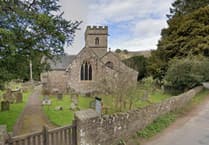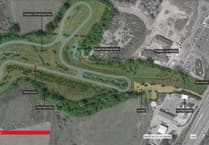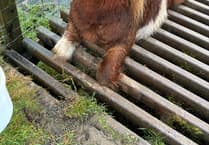A SPECIAL service was hosted at St. Mary’s Priory on Saturday to commemorate 3rd Mons day and remember the heavy casualties the Abergavenny based battalion suffered at the Battle of Frezenberg Ridge.
The Monmouthshire Regiment, formed in 1908, consisted of three Battalions drawn from different areas of the county. Abergavenny was the headquarters of the 3rd Battalion (3rd Mons) which included two companies from Abertillery, one each from Blaina, Sirhowy, Tredegar, Ebbw Vale and Cwm and one company from Abergavenny.
Also known as the third engagement of the Second Battle of Ypres, the Battle of Frezenberg Ridge saw a total of 526 men from the Monmouthshire Regiment lose their lives in the Belgium killing fields of the Great War. A further 799 were wounded.
The Battle of Ypres has becomes notorious, not only for the terrible loss of life, but also because it was the first time that the German army used poison gas on the Western Front.
During a furious and prolonged German assault, the men of the Third Battalion suffered the heaviest fatalities.
On May 8, 1915, the Monmouthshire Regiment were tasked with defending the strategic Ridge and preventing the Germans from occupying the Belgium city of Ypres and seizing the vital channel ports.
Outnumbered, out gunned, and against the odds, the Monmouthshire Battalions held fast and stood their ground. But at great cost.
By the end of the first day, 211 men had fallen. Before the engagement ended on May 13, hundreds more would join their rank
As the carnage unfolded in a terrible mass of gunfire and shelling, the Monmouthshires endured day after day of relentless German attack as they struggled to hold Frezenberg Ridge.
Prior to Frezenberg, the first engagement of Ypres was the Battle of Gravenstafel Ridge (April 22-23 1915). It was here that chemical warfare reared its ugly head for the first time and proceeded to play a monstrous part in defining the fearful symmetry of World War One.
German troops opened 5,700 gas cylinders containing 168 tons of chlorine gas and released the deadly poison to the wind.
The indiscriminate poison turned on many of the German troops who were killed and injured when carrying out the attack. However, it was the 6,000 plus French troops in the direct path of the gas cloud who were hit the worst.
The gas caused men to froth at the mouth as they died a violent and agonizing death. Those who managed to survive were temporarily blinded, and as they stumbled from their trenches into no-man’s land they were mown down by enemy fire.
The use of chlorine gas allowed the Germans to advance and gain a tactical advantage.
As the battle went on the allies fashioned their own makeshift defence against the gas. They found by urinating on a piece of cloth and holding it to heir face they could counter the deadly effects.
Prior to the Battle of Frezenberg Ridge, the 3rd Mons were subject to a relentless German bombardment on the evening of May 4. Casualties were high and the front line troops soon became exhausted.
Captain O W D Steel, who was a doctor in civilian life, led a company of troops to reinforce the front line. Many were cut to ribbons by the fierce German machine gun fire.
As he was leading the advance, Capt. Steel also attended to the high number of casualties. He was later awarded the Military Cross for his actions.
Private A M Mitchell, wrote home to commend his Captain’s courage, “Words utterly fail me to say what a hero Capt. O?W?D Steel was during that fearful struggle. From every person I meet they tell me the same tale. Under very heavy shell and maxim fire he went out and fetched in wounded, bandaging them and if he doesn’t deserve the V.C. no man on earth ought to get it . . . I would like you to let everyone in Abergavenny know what a brave officer he is.”
After retiring to battalion headquarters, weary, worn, and with hundreds of their brothers in arms dead, the 3rd Mons were ordered to carry out a counter attack on Frezenberg.
While holding Frezenberg Ridge the troops experienced a hell and horror without equal.
Private Badham, of Abergavenny, wrote to a friend from hospital, “The 8th was the day I shall never forget. They started bombarding the same time in the morning, and about half an hour afterwards we could hear a long blast of a whistle, and the attack started.
“We were only a handful of men, and they came on in thousands, but we kept them at bay; but I knew we would have to give way before long. The fellows on our left and right were retiring and we had orders to do the same, but we did not go until we put some more shots into them.
It was in the retirement that we lost a lot of men. They were bayoneting our wounded that we had to leave behind. Well, we got back to our second line of trenches, and reinforcements came up. After that I don’t know what happened. I went to the hospital with shrapnel in my back and a big bruise on my shoulders and the gas in my eyes.”
Due to the fierce fighting at Frezenberg and subsequent engagements, by May 28 the mauling of the three battalions of Monmouthshire was so complete the three were amalgamated. It wasn’t until August 11 that they resumed their own separate identities.
A year previous to the Battle of Frezenberg Ridge, the brave men who made up the 3rd Mons had little idea of the apocalyptic carnage which would take the lives of so many and leave the survivors changed men.
It was a glorious August day when the entire battalion of the 3rd Mons gathered outside Abergavenny Market Hall on August 5, 1914. Dawn was breaking and the air was full of promise. Jovial and full of high spirits the troops marched to Bailey Park for morning tea.
The battalion colours were handed over to the custody of the Town Mayor. The soldiers then proudly marched out of the town to the railway station as crowds cheered and flags were waved.
Sitting aboard a train bound for Pembroke Dock, many of the Monmouthshire men would have gazed out of the windows at the surrounding mountains.
As the Blorenge, the Sugar Loaf, the Skirrid and the Deri faded from view, some may have even felt the first pangs of homesickness and uncertainty about the road ahead.
Most would have felt excited about what would have been seen through the optimistic eyes of a young man as the adventure of a lifetime.
That optimism was to be cruelly short-lived.
Of the 1020 soldiers of the 3rd Battalion of the Monmouthshire Regiment who had arrived in France in February 1915, only a scattered few remained alive to see the dawn break on the morning of May 9.




